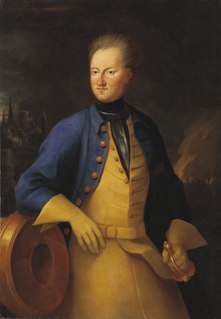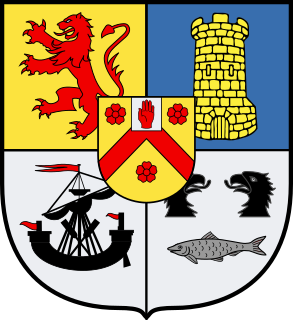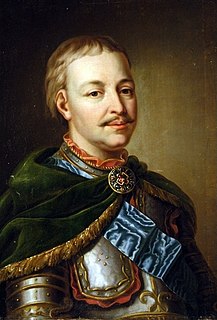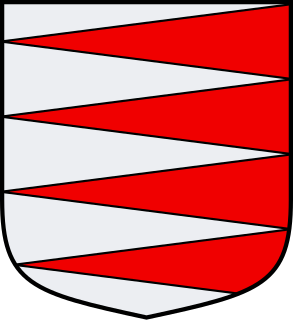 W
WThe Battle of Poltava was the decisive victory of Peter the Great over the Swedish Empire forces under Swedish king Charles XII, in one of the battles of the Great Northern War.
 W
WCount Jacob Bruce was a Russian statesman, general, diplomat and scientist of Scottish descent, one of the chief associates of Peter the Great. According to his own record, his ancestors had lived in Russia since 1647. He was the brother of Robert Bruce, the first military governor of Saint Petersburg.
 W
WCharles XII, sometimes Carl XII or Carolus Rex, was King of Sweden from 1697 to 1718. He belonged to the House of Palatinate-Zweibrücken, a branch line of the House of Wittelsbach. Charles was the only surviving son of Charles XI and Ulrika Eleonora the Elder. He assumed power, after a seven-month caretaker government, at the age of fifteen.
 W
WPrince Boris Ivanovich Kurakin was the third permanent Russian ambassador abroad, succeeding Andrey Matveyev in The Hague and one of the closest associates of Peter the Great. He was also the tsar's brother-in-law, being married to Xenia, daughter of Feodor Abramovich Lopukhin and sister of Eudoxia Lopukhina.
 W
WAdam Ludwig Lewenhaupt was a Swedish general, particularly known for his participation in the Great Northern War.
 W
WFriherre Rutger Maclean I (1688–1748) or Rutger Macklean I was an officer of Charles XII of Sweden who participated in Battle of Holowczyn, Battle of Poltava and Battle of Tobolsk in the Great Northern War.
 W
WIvan Stepanovych Mazepa served as the Hetman of Zaporizhian Host in 1687–1708. He was awarded a title of Prince of the Holy Roman Empire in 1707 for his efforts for the Holy League. The historical events of Mazepa's life have inspired many literary, artistic and musical works. He was famous as a patron of the arts.
 W
WPrince Aleksander Danilovich Menshikov was a Russian statesman, whose official titles included Generalissimus, Prince of the Russian Empire and Duke of Izhora, Prince of the Holy Roman Empire, Duke of Cosel. A highly appreciated associate and friend of Tsar Peter the Great, he was the de facto ruler of Russia for two years.
 W
WCount Carl Piper was a Swedish statesman. He entered the foreign office after completing his academical course at Uppsala, accompanied Benedict Oxenstjerna on his embassage to Russia in 1673, and attracted the attention of Charles XI during the Scanian War by his extraordinary energy and ability.
 W
WCount Carl Gustav Rehnskiöld was a Swedish Field Marshal (Fältmarskalk) and Royal Councillor. He was mentor and chief military advisor to King Charles XII of Sweden, and served as deputy commander-in-chief of the Carolean Army, an army he assisted both in its education and development.
 W
WJohan Gustaf Renat (1682–1744) was a Swedish soldier and cartographer. He is primarily known for his role in bringing detailed maps of Central Asia to Europe after close to two decades in captivity.
 W
WJoachim von Rohr was a lieutenant colonel for the Swedish Empire and Commandant of the Dalarö fortress. He participated in the Battle of Poltava and was captured and held as a prisoner of war in Solikamsk in Russia.
 W
WMalcolm Sinclair was a Swedish officer, nobleman and envoy who was murdered by two Russian officers on his way home from the Ottoman Empire. The assassination eventually sparked the Russo–Swedish War of 1741–1743 and also inspired the so-called "Sinclairvisan", a song about Sinclair by Anders Odel.
 W
WPhilip Johan von Strahlenberg (1676–1747) was a Swedish officer and geographer of German origin who made important contributions to the cartography of Russia.
 W
WCarl Henrik Wrangel, friherre Wrangel af Adinal was an officer of the Swedish Army, attaining the rank of Field Marshal.